


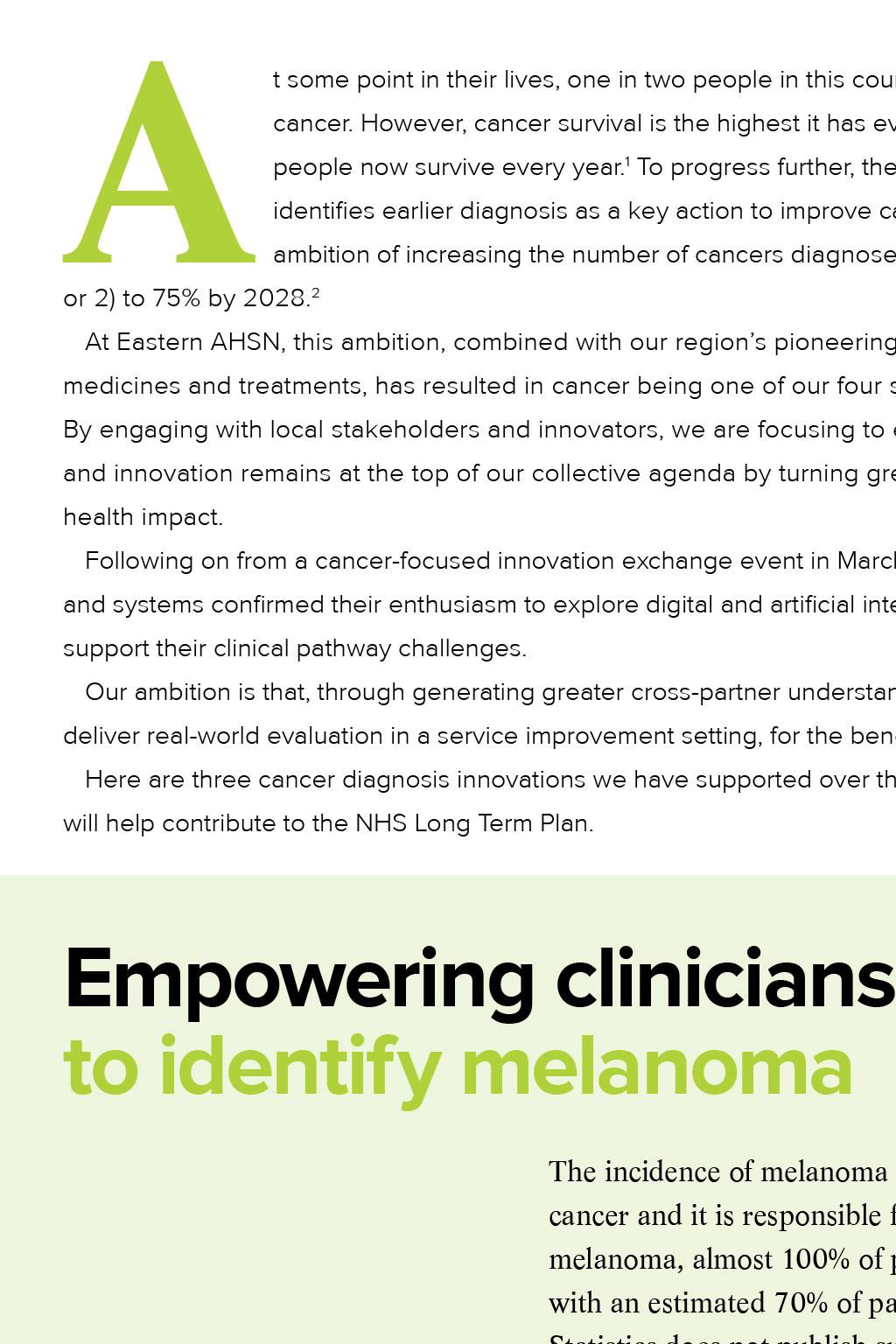
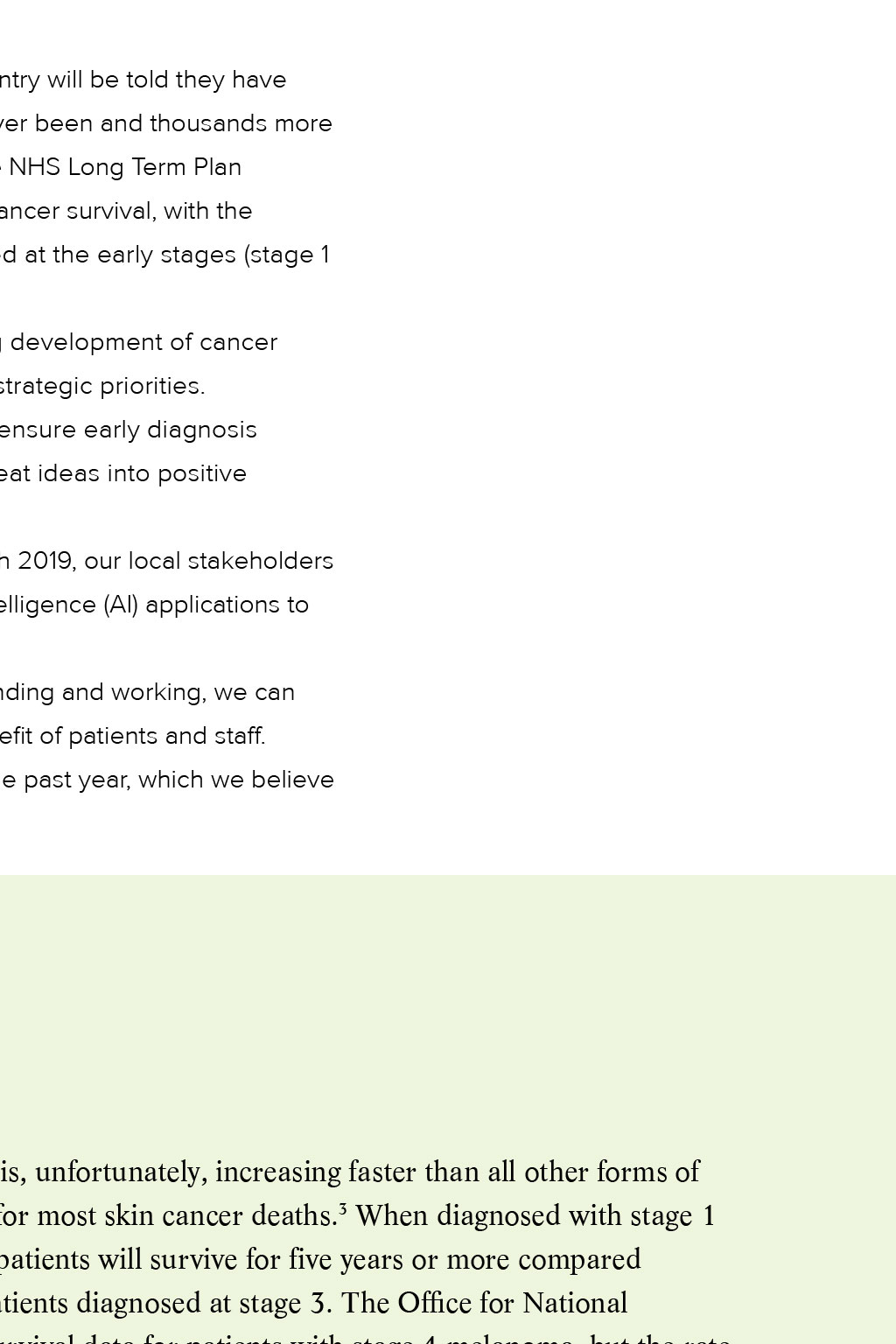
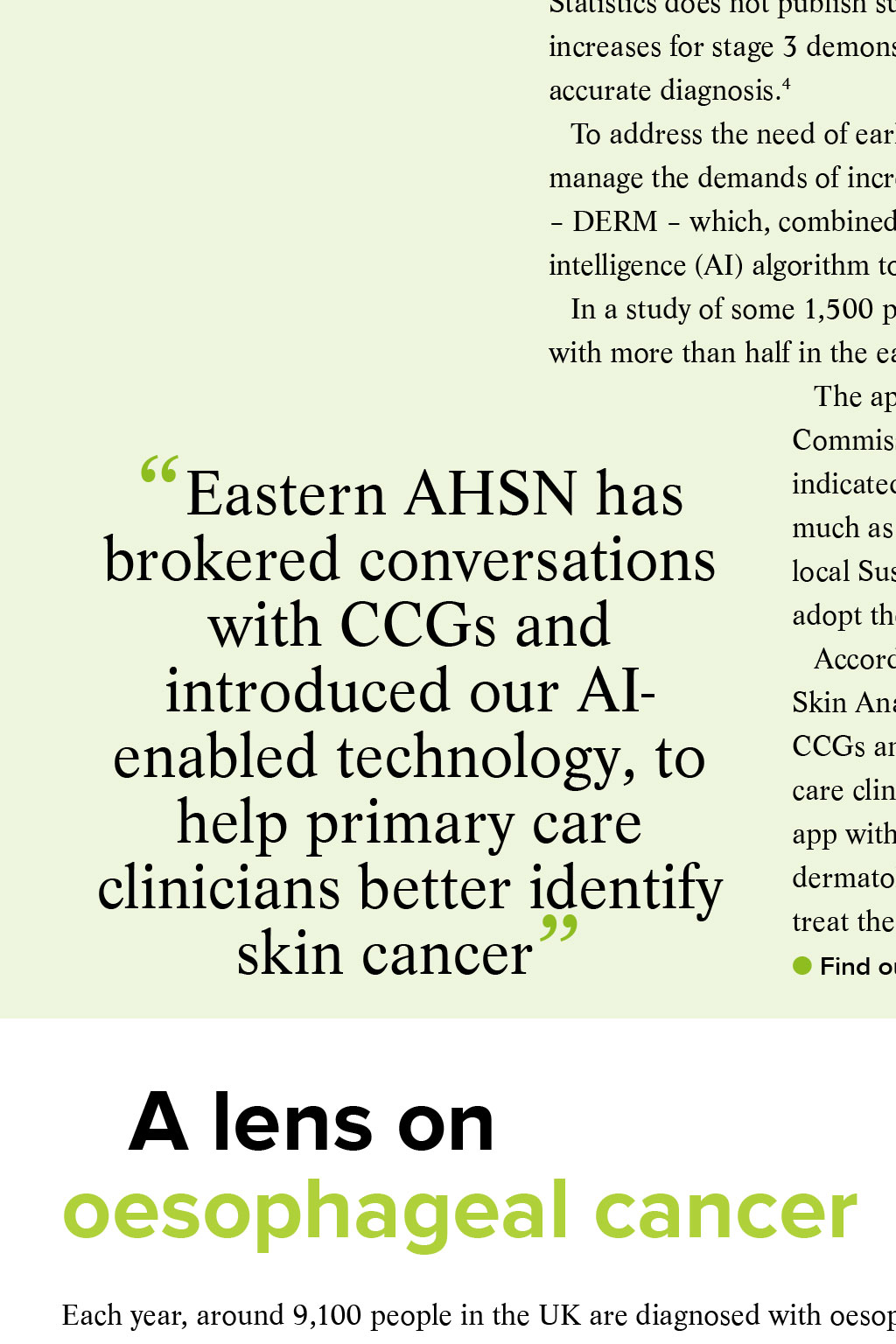
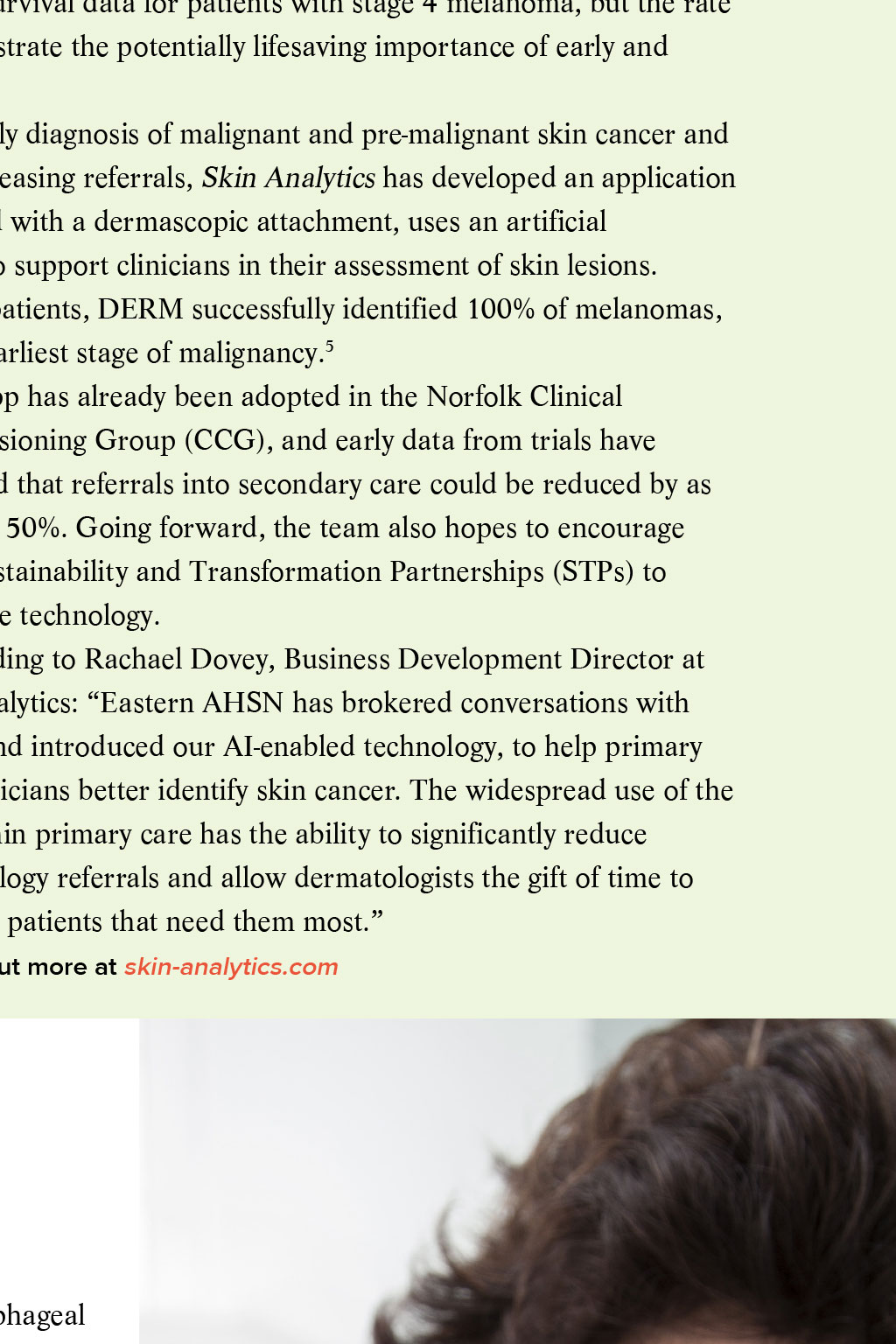


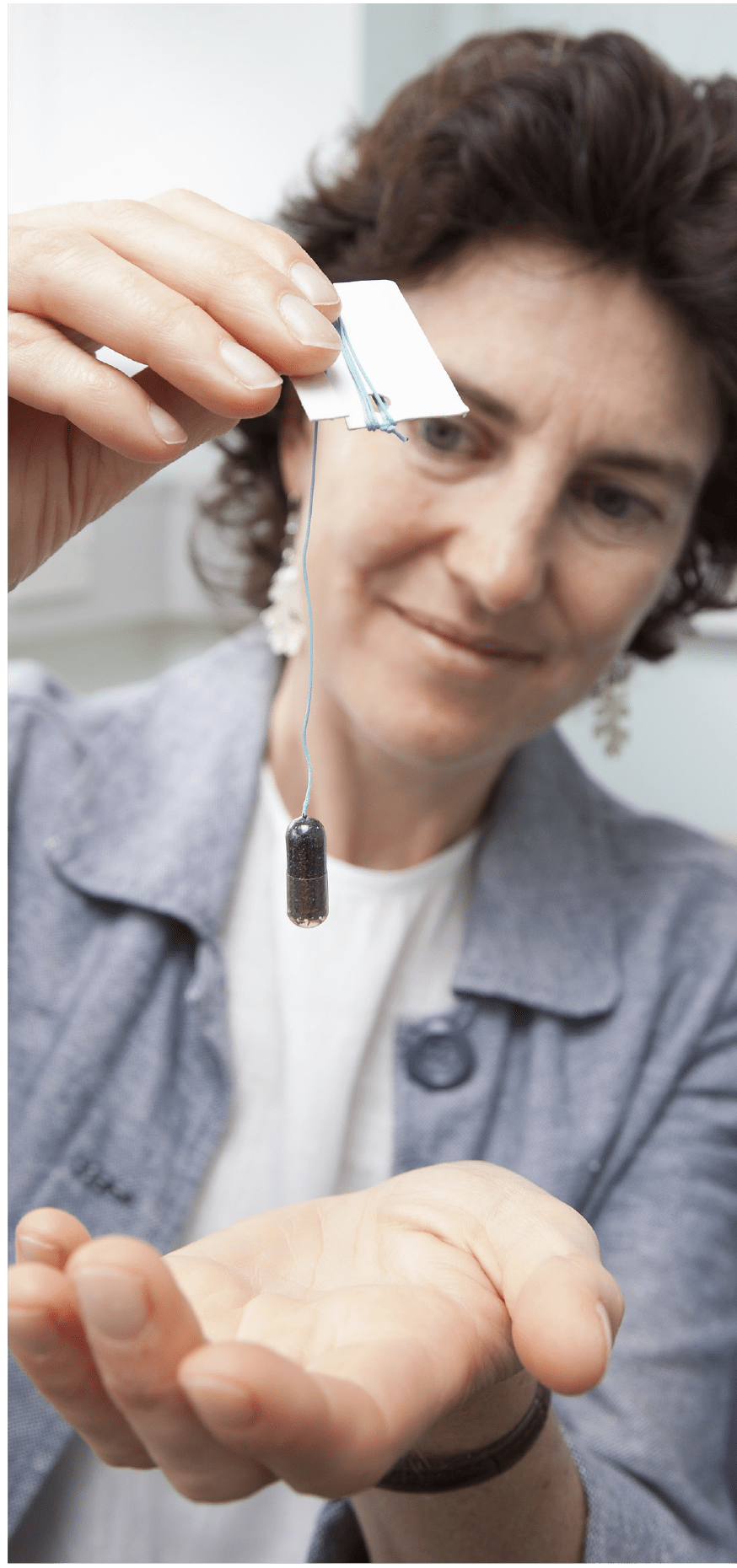
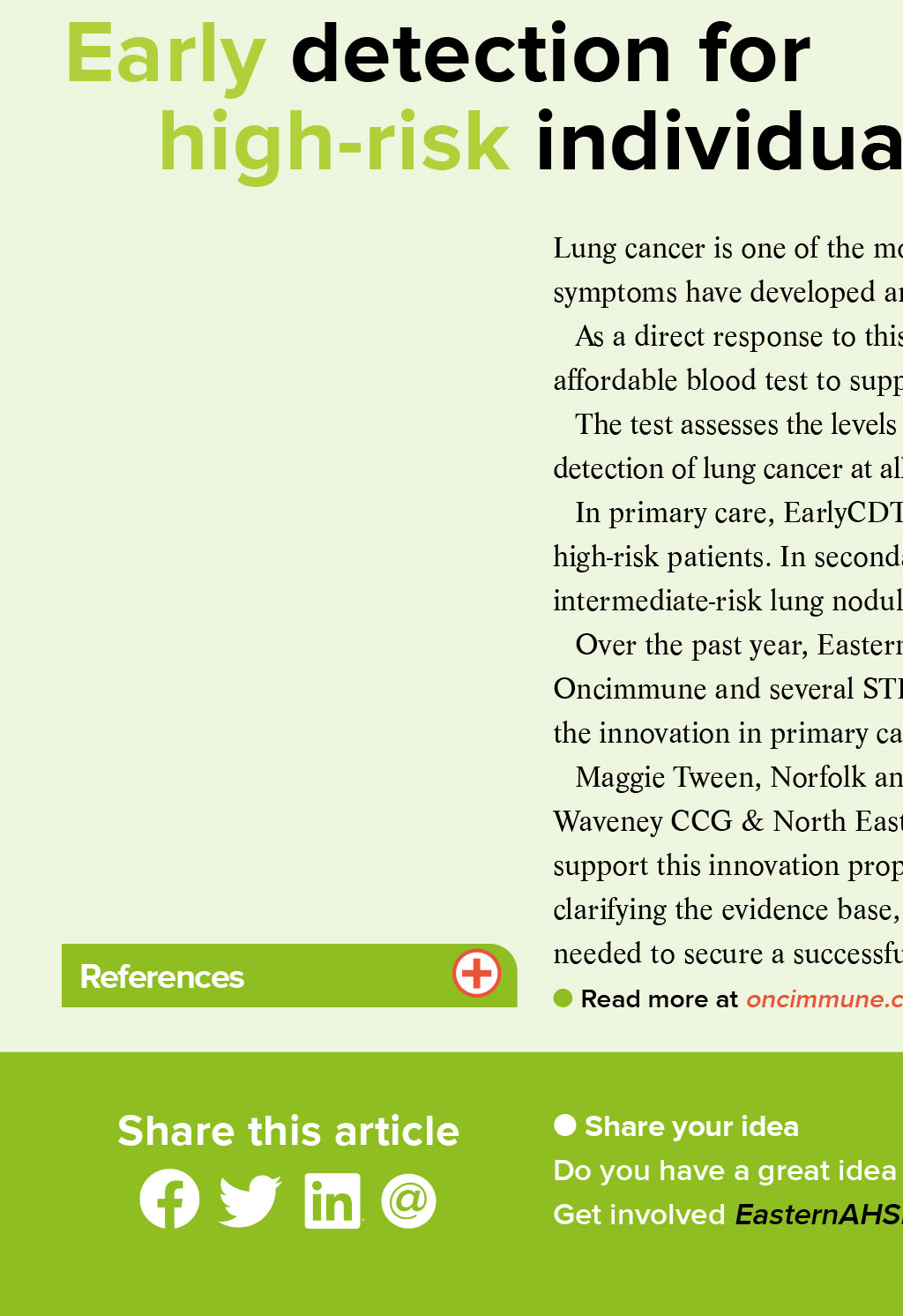
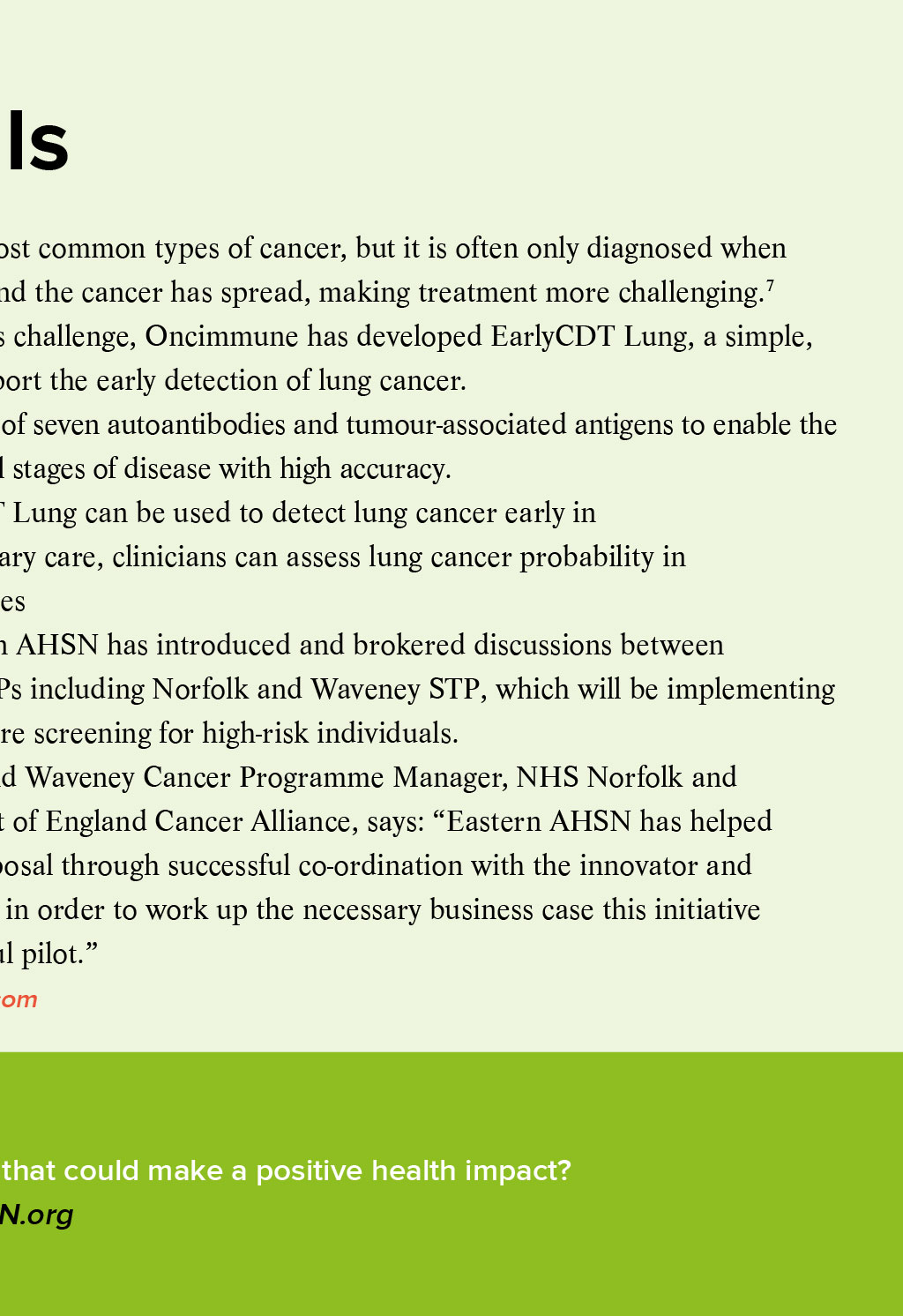













Focus on: cancer Surviving cancer through early diagnosis Katrina Wilson, Principal Advisor, Cancer at Eastern AHSN highlights three cancer innovations contributing to earlier diagnosis A t some point in their lives, one in two people in this country will be told they have cancer. However, cancer survival is the highest it has ever been and thousands more people now survive every year.1 To progress further, the NHS Long Term Plan identifies earlier diagnosis as a key action to improve cancer survival, with the ambition of increasing the number of cancers diagnosed at the early stages (stage 1 or 2) to 75% by 2028.2 At Eastern AHSN, this ambition, combined with our regions pioneering development of cancer medicines and treatments, has resulted in cancer being one of our four strategic priorities. By engaging with local stakeholders and innovators, we are focusing to ensure early diagnosis and innovation remains at the top of our collective agenda by turning great ideas into positive health impact. Following on from a cancer-focused innovation exchange event in March 2019, our local stakeholders and systems confirmed their enthusiasm to explore digital and artificial intelligence (AI) applications to support their clinical pathway challenges. Our ambition is that, through generating greater cross-partner understanding and working, we can deliver real-world evaluation in a service improvement setting, for the benefit of patients and staff. Here are three cancer diagnosis innovations we have supported over the past year, which we believe will help contribute to the NHS Long Term Plan. Empowering clinicians to identify melanoma The incidence of melanoma is, unfortunately, increasing faster than all other forms of cancer and it is responsible for most skin cancer deaths.3 When diagnosed with stage 1 melanoma, almost 100% of patients will survive for five years or more compared with an estimated 70% of patients diagnosed at stage 3. The Office for National Statistics does not publish survival data for patients with stage 4 melanoma, but the rate increases for stage 3 demonstrate the potentially lifesaving importance of early and accurate diagnosis.4 To address the need of early diagnosis of malignant and pre-malignant skin cancer and manage the demands of increasing referrals, Skin Analytics has developed an application – DERM – which, combined with a dermascopic attachment, uses an artificial intelligence (AI) algorithm to support clinicians in their assessment of skin lesions. In a study of some 1,500 patients, DERM successfully identified 100% of melanomas, with more than half in the earliest stage of malignancy.5 The app has already been adopted in the Norfolk Clinical Commissioning Group (CCG), and early data from trials have indicated that referrals into secondary care could be reduced by as much as 50%. Going forward, the team also hopes to encourage local Sustainability and Transformation Partnerships (STPs) to adopt the technology.According to Rachael Dovey, Business Development Director at Skin Analytics: “Eastern AHSN has brokered conversations with CCGs and introduced our AI-enabled technology, to help primary care clinicians better identify skin cancer. The widespread use of the app within primary care has the ability to significantly reduce dermatology referrals and allow dermatologists the gift of time to treat the patients that need them most.” Find out more at skin-analytics.com A lens on oesophageal cancer Each year, around 9,100 people in the UK are diagnosed with oesophageal cancer, a disease which is more common in older people.6 Cytosponge has developed a tool to detect Barretts Oesophagus a precursor to oesophageal cancer which is minimally invasive and can be used in primary care. Using Cytosponge, a patient swallows a capsule, about the size of a multivitamin pill, which is attached to a cord. When swallowed, the capsule dissolves to release a sponge. The sponge can then be removed by a nurse a few minutes later collecting cells along its passage. These cells are then tested in the laboratory using an accurate method developed by the Fitzgerald Laboratory. Prof Rebecca Fitzgerald, prof of Cancer Prevention at the Medical Research Cancer Unit, University of Cambridge and Co-Lead of the Cancer Research UK Early Detection Programme in Cambridge, who developed the technology, commented: The real problem with this disease is late diagnosis, and unfortunately a lot of patients are incurable at presentation, so the overall survival rate is extremely low less than 20% which is why we are so passionate about improving early diagnosis of this disease. Prof Fitzgerald continued: Bear in mind that to run an endoscopy unit requires multiple staff members including at least three healthcare professionals at any one endoscopy. In contrast, Cytosponge can be delivered in an office setting by a single health worker. In April 2020, Dr Oliver Stovin, Joint Cancer Lead at Cambridge and Peterborough CCG, Macmillan GP and GP Appraiser NHS England, Central Midlands, said: With the support of Eastern AHSN, we are ready to proceed with a project to explore the feasibility of delivering Cytosponge in primary care and a number of primary care networks have expressed interest in being involved. Once restrictions associated with COVID-19 are lifted, the plan is to perform 500 tests in primary care, to assess the practical delivery of the service. Early detection for high-risk individuals NHS Long Term Plan., (2019). Cancer [online]. NHS Long Term Plan. [Viewed 30th April 2020]. Available from https:// www.longtermplan.nhs.uk/areas-of-work/ cancer/ 1 NHS., (2019). NHS Long Term Plan. Chapter 3.51 [online]. [Viewed 30th April 2020]. Available from https://www. longtermplan.nhs.uk/online-version/ chapter-3-further-progress-on-carequality-and-outcomes/better-care-formajor-health-conditions/cancer/ 2 The Royal Marsden NHS Foundation Trust. Skin Cancer: Incidence and risk factors. [online]. The Royal Marsden NHS Foundation Trust. [Viewed 30th April 2020]. Available from https://www. royalmarsden.nhs.uk/information-gps/gpresources/skin-cancer/skin-cancerincidence-and-risk-factors 3 Office for National Statistics, (2019). Oneyear and five-year net survival for adults (15-99) in England diagnosed with one of 29 common cancers, by age and sex. [Data set]. Office of National Statistics. [Accessed 30th April 2020]. Available from https://www.ons. 4 References Share this article gov.uk/peoplepopulationandcommunity/ healthandsocialcare/ conditionsanddiseases/ datasets/cancersurvivalratescancer survivalinenglandadultsdiagnosed Lung cancer is one of the most common types of cancer, but it is often only diagnosed when 5 Phillips, M., et al. (2019) Assessment of symptoms have developed and the cancer has spread, making treatment more challenging.7 Accuracy of an Artificial Intelligence AlgorithmAs to Detect Melanoma in Images a direct response to this challenge, Oncimmune has developed EarlyCDT Lung, a simple, of Skin Lesions. Journal of the American affordable blood test to support the early detection of lung cancer. Medical Association Netw Open [online]. 2(10). [Viewed 2020]. Available The30th testApril assesses the levels of seven autoantibodies and tumour-associated antigens to enable the from doi.org/10.1001/ jamanetworkopen.2019.13436 detection of lung cancer at all stages of disease with high accuracy. primary care,What EarlyCDT Lung can be used to detect lung cancer early in 6 Cancer In Research UK., (2019). is oesophageal cancer? [online]. Cancer high-risk patients. In secondary care, clinicians can assess lung cancer probability in Research 6 UK. [Viewed 30th April 2020]. Available from https://www. lung nodules intermediate-risk cancerresearchuk.org/about-cancer/ Over the past year, Eastern AHSN has introduced and brokered discussions between oesophageal-cancer/about Oncimmune and several STPs including Norfolk and Waveney STP, which will be implementing 7 National Institute for Health and Care Excellence., (2019). Lung cancer: the innovation in primary care screening for high-risk individuals. diagnosis and management NICE Tween, Norfolk and Waveney Cancer Programme Manager, NHS Norfolk and guidelineMaggie [NG122] [online]. National Institute for Health and Care& Excellence. Waveney CCG North East of England Cancer Alliance, says: Eastern AHSN has helped [Viewed 3rd April 2020]. Available from https://www.nice.org.uk/guidance/ support this innovation proposal through successful co-ordination with the innovator and ng122/informationforpublic clarifying the evidence base, in order to work up the necessary business case this initiative needed to secure a successful pilot. Read more at oncimmune.com Share your idea Do you have a great idea that could make a positive health impact? Get involved EasternAHSN.org